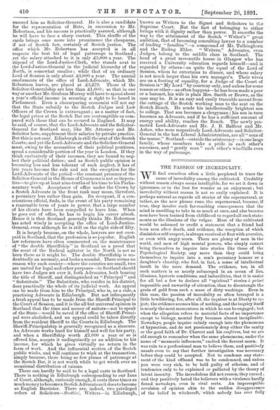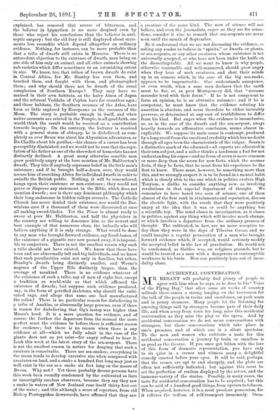THE PASSION OF INCREDULITY.
NVE find ourselves often a little perplexed to trace the cause of incredulity among the cultivated. Credhlity without reason always seems intelligible, for we set it down to ignorance, or to the lust for wonder as an enjoyment ; but incredulity without reason is not so easily explained: It is perhaps natural as regards all stories of the supernatural, or rather, as the new phrase runs, the supernormal, because, if true, they involve such far-reaching consequences that the mind is unwilling to take in so much at once, and also because men have'been trained from childhood to regard all such state- ments as the illusions of the vulgar. Most of the cultivated would be ashamed to credit a statement that a friend had been seen after death, and evidence, the reception of which diminishes self-respect, is always received at first with aversion, or even with angry scorn. There are plenty of men in the world, and men of high mental powers, who simply cannot bring themselves to inquire into stories like those of the Psychological Society, any more than they could bring themselves to inquire into a son's pecuniary honour or a daughter's chastity, who feel, in fact, a sense of intellectual insult in the mere demand. The evidence, too, in all such matters is so nearly submerged in an ocean of lies, illusions, hysteric conditions, and imbecilities, that it is easier for all but a few to declare all "spiritual" stories a priori impossible and unworthy of attention, than to disentangle the grain of gold from such a mass of dirty washings. Even in this case, the passion of incredulity so often betrayed is a little bewildering, for, after all, the inquirer is at liberty to re- ject; the evidence accuses him of nothing, and the inquiry itself is nearly the most momentous in which he can be engaged ; but when the allegation refers to material facts of no importance except to biology, mental fury becomes almost inexplicable. Nowadays, people inquire calmly enough into the phenomena of hypnotism, and do not passionately deny either the sanity or the good faith of Dr. Charcot and his confreres, but we are old enough to remember when the same phenomena, under the name of " mesmeric influences," excited the fiercest scorn. It was ruin to a professional man to believe them, and positively unsafe even to say that further investigation was necessary before they could be accepted. Not to condemn any state- ment of the kind offhand was to be condemned, and unless you were very rich, to be held guilty of atheism, and of tendencies only to be explained or palliated by the theory of latent insanity. The incredulous did not reason, they cursed ; and they positively hated the believers with a virulence hardly found nowadays, even in rival sects. An imperceptible revulsion of opinion akin to the sudden disappearance of the belief in witchcraft,' which nobody has ever fully explained, has removed that source of bitterness, and the believer in hypnotism is no more despised even by those who reject his conclusions than the believer in anti- septic surgery; but the old fury is still displayed about state- ments less recondite which depend altogether on ordinary evidence. Nothing, for instance, can be more probable than that a tribe of dwarfs still exists in Morocco. There is no antecedent objection to the existence of dwarfs, man being on one side of him only an animal, and all other animals showing sub-varieties which differ sometimes to an astonishing extent in size. We know, too, that tribes of brown dwarfs do exist in Central Africa, for Mr. Stanley has seen them, and touched them, and fought with them, and photographed them ; and why should there not be dwarfs of the usual complexion of Southern Europe P They may have re- mained in their own habitats, as the hairy Aims of Japan and the arboreal Veddahs of Ceylon have for countless ages ; and those habitats, the Southern recesses of the Atlas, have been as little explored by Europeans as the recesses of the Moon. The story is probable enough in itself, and when native accounts are related in the Temple, in all good faith, one would think the result would be received as a contribution towards inquiry. On the contrary, the lecturer is received with a general storm of obloquy, he is disbelieved as com- pletely as ever Bruce was about his Abyssinian adventures, or Du Chaillu about his gorillas,—his chance of a career has been perceptibly diminished, and we would not be sure that the repu- tation of his father as one of the shrewdest of humorists has not distinctly declined. A great many otherwise sensible men grow positively angry at the bare mention of Mr. Haliburton's dwarfs. They bite if anybody expresses belief in the little men's existence ; and if he brought half-a-dozen over, they would accuse him of searching Africa for individual dwarfs in order to swindle the British public. Nothing, it will be remembered, hangs upon their existence or non-existence ; they would not prove or disprove any statement in the Bible, which does not mention dwarfs ; nor is there any dominant philosophy which their long endurance in hidden valleys oversets. The Catholic Church has never denied their existence, nor would the Dar- winians care if a thousand of them were discovered at once all making sword-blades. Yet the Times is almost ready to swear at poor Mr. Haliburton, and half the physicists in the country are willing to denounce him as the newest and best example of that numerous class, the imbecile who will believe anything if it is only strange. What would be done to any man who brought forward evidence, say fossil-bones, of the existence of a gigantic race now passed away, it is impossi- ble to conjecture. There is not the smallest reason why such a tribe should not have existed. We know that there have been and are abnormally tall and big individuals, and we know that such peculiarities exist not only in families, but tribes, Stanley's dwarfs being distinctly smaller, and Werne's negroes of the Upper Nile distinctly larger, than the average of mankind. There is no evidence whatever of the existence of such a tribe, say of men of eight feet, except a tradition as world-wide as that which affirmed the existence of dwarfs ; but suppose such evidence produced, say, in the form of petrified skeletons, why should the culti- vated rage, and allege that some one had manufactured the relics P There is no particular reason for disbelieving in a tribe of Anakim, or abnormally large persons, even if there is reason for disbelieving that Og's instep was higher than Moses's head. It is a mere question for evidence, and of course the further the departure from the normal the more perfect must the evidence be before there is sufficient reason for credence; but there is no reason when there is any evidence at all—which we fully admit in the case of the giants does not as yet exist—for angry refusal to hear it. Look this week at the latest story of the sea-serpent. There is not the smallest reason in nature for denying that such a creature is conceivable. There are sea-snakes ; everything in the ocean tends to develop excessive size when compared with creatures on land, and a snake a hundred feet long may just as well exist in the sea as a snake six feet long on the moors of Devon. Why not P Yet three probably decent persons have this week been roundly condemned by the cultivated as liars or incorrigibly careless observers, because they say they saw a snake in waters off New Zealand rear itself thirty feet out of the water ; and this although a score of reporters, from old Bishop Pontoppidan downwards, have affirmed that they saw
a creature of the same kind. The men of science will not believe, and even the journalists, eager as they are for sensa- tions, consider it wise to remark that sea-serpents are never seen until the month of September.
Be it understood that we are not discussing the evidence, or asking any reader to believe in "spirits," or dwarfs, or giants, or sea-serpents, or any other creatures whose existence is not universally accepted, or who have not been under the knife on the dissecting-table. All we want to know is why people, otherwise reasonable and well-mannered, should grow angry when they hear of such creatures, and shut their minds up in an armour which, in the case of the big sea-snake, appears to be impenetrable. One understands annoyance, or even wrath, when a sane man declares that the earth must be fiat, or, as poor Montgomery did, that " streams meander level with their fount." If he is not competent to form an opinion, he is an obtrusive nuisance ; and if he is competent, he must know that the evidence refuting his assertion is absolute, and must therefore be either incurably perverse, or determined at any cost of truthfulness to differ from his kind. But anger when the evidence is inconclusive, or, as in the case of the dwarfs and the sea-serpent, sways heavily towards an affirmative conclusion, seems almost in- explicable. We suppose its main cause is contempt, produced by a long recoil from the emotional credulity which has no doubt through all ages been the characteristic of the vulgar. Scorn is a distinctive mark of the educated—all experts are educated in their own subject, and a sailor thinks a landsman a fool for not understanding his ropes—and no form of scorn is more common or more deep than the scorn for new facts, which the scorner feels, if they be facts, that he must from his experience be the first to know. There must, however, be something more than this, and we strongly suspect it is to be found in a mental habit which is closely akin to the one which in politics evolves High
Toryism, a dislike to consider anything new, as involving revolutions in that especial department of thought. We remember to have heard two men of science, one of them almost of the first rank in attainments and reputation, discuss the electric light, with the result that they were positively angry at the idea that it was or could be anything but a scientific toy. The mind closes in investigation, as it closes in politics, against any thing which will involve much change, or which involves a departure from the ordinary grooves of thought. The cultivated, in fact, are no more receptive to- day than they were in the days of Tiberius Cresar, and we could imagine a regular persecution of a man who brought forward evidence which, if accepted, would seriously modify the accepted belief in the law of gravitation. He would not be condemned, as Galileo was, on religious grounds, but he would be treated as a man with a dangerous or contemptible weakness in his brain. Men can positively hate out of incre- dulity alone.



































 Previous page
Previous page